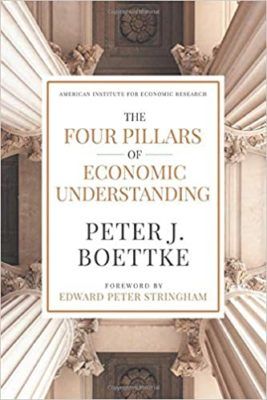The Burden of Proof Needs to Change
If something is wrong in society, whom should be charged with fixing it? Today, there is a presumption that government should be. The 19th-century theory of liberalism posited the opposite — that there should be a presumption in favor of markets and society, not government. The burden of proof was borne not by market actors but by those who claimed the power of the state was the only way forward.
In any discussion, the burden of proof comes to rest on one side or the other. This is because of the tacit presuppositions that exist prior to the conversation. By analogy, we might argue that there is a presumption of innocence, for example, and thus the burden of proof falls on the prosecutor. In liberal societies, this theory in criminal justice was held in order to avoid the egregious error of convicting an innocent party of a crime they didn’t commit. Accordingly, liberal societies were willing to put up with the possibility of the other error: letting a guilty party go free. Again, the burden of proof must be on those who want to convict.
The Economist
Apply this reasoning to the long history of the debate between government and the market. As Ludwig von Mises in Human Action (1966, 67) argues, it is impossible to understand the long history of economic thought unless one understands that throughout the history of the discipline the economist was always the troublemaker for the would-be governor over the economy. It was the economist’s job to rain on the parade: to raise the issue of constraints, to explain the problems with unintended consequences associated with desired policy remedies, and to demonstrate with logical rigor the impossibility of schemes to rationally plan an economic system. The economist cannot be the favorite of demagogues and dictators; instead the economist is their intellectual gadfly. It is the economist who explains clearly and forcefully the parameters reality places on utopian aspirations.
But while that role of the economist can clearly be seen from Adam Smith to John Stuart Mill, in the 20th century the economist often perpetuated social control rather than limiting their analysis to social understanding. In my book F. A. Hayek: Economics, Political Economy and Social Philosophy (2018), I argue that this transformation was a result of an alliance between scientism and statism. But rather than go into details about that transformation, today I want to remind readers of the wisdom of the classical political economists, and the presumption of innocence and the burden of proof in the debate over the market economy.
John Stuart Mill
John Stuart Mill is a pivotal figure because in many ways he set the stage for this later alliance. But in very significant ways, he also was one of the most articulate spokespersons for the liberal presumptions. As he writes in Principles of Political Economy (1848, 945): “Laisser-faire, in short, should be the general practice: every departure from it, unless required by some great good, is a certain evil.” How did Mill reason to that conclusion?
Prior to that statement, Mill walks his reader through the maxims that follow from the primary function of government, which is to protect persons and property. He argues that government actions should be restricted to that function because of the threat to human freedom from the arbitrary use, and abuse, of power, and because of the threat of detrimental economic performance due to perverse incentives and distortions in the information utilized by economic actors in coordinating their decisions with one another.
Mill takes as his task to argue against the erroneous theories that are invoked to call for government interference in the market economy. These popular fallacies must be exposed, according to Mill, and they include (1) the doctrine of protectionism, (2) the restrictions on usury, (3) the regulation of prices, (4) the granting of monopoly privileges, (5) laws against voluntary combinations of workers, and (6) restrictions of the free exchange of opinions. Mill explains the negative consequences that result for freedom and prosperity when these fallacies are allowed to guide public policy.
He also argues that such overstretch by government thwarts human development. “To be prevented from doing what one is inclined to, or from acting according to one’s own judgment of what is desirable,” Mill writes (1848, 938), “is not only always irksome, but always tends pro tanto, to starve the development of some portion of the bodily or mental faculties, either sensitive or active; and unless the conscience of the individual goes freely with the legal restraint, it partakes either in a great or a small degree, of the degradation of slavery.”
Mill concludes by stating, “Scarcely any degree of utility, short of absolute necessity, will justify a prohibitory regulation, unless it can also be made to recommend itself to the general conscience; unless persons of ordinary good intentions either believe already, or can be induced to believe, that the thing prohibited is a thing which they ought not to wish to do.”
Note two things here: first, the presumption of argument begins by placing the burden of proof on those who want to regulate the activity of the market; and second, if the argument can be established that the market cannot achieve the public good, or that what the market does achieve is morally suspect and harmful to the individual as they would judge it themselves, then the presumption of argument can be reversed.
Liberty or Power
With the development of market-failure theory and also critiques of the rationality of individuals based on their ignorance, biases, and weaknesses of will, the presumption of the argument was reversed in economic debates. The ugly market supposedly was plagued by externalities, underprovision of public goods, monopoly power, macroeconomic volatility, environmental degradation, and more. Government was seen as the corrective to social ills that resulted in inequality, instability, and injustice. What happened to the earlier concerns with perverse incentives and distortions of information that would result in a loss of freedom and reduction in economic well-being?
We are in this discussion, and the burden of proof rests squarely on the shoulders of the economist who believes that the laissez-faire maxim should be the general practice. The question is what the most effective arguments are for switching the argumentative presumption. Without doing that, the error bias will be toward convicting that innocent party and the liberal principles of justice will continually be violated.












